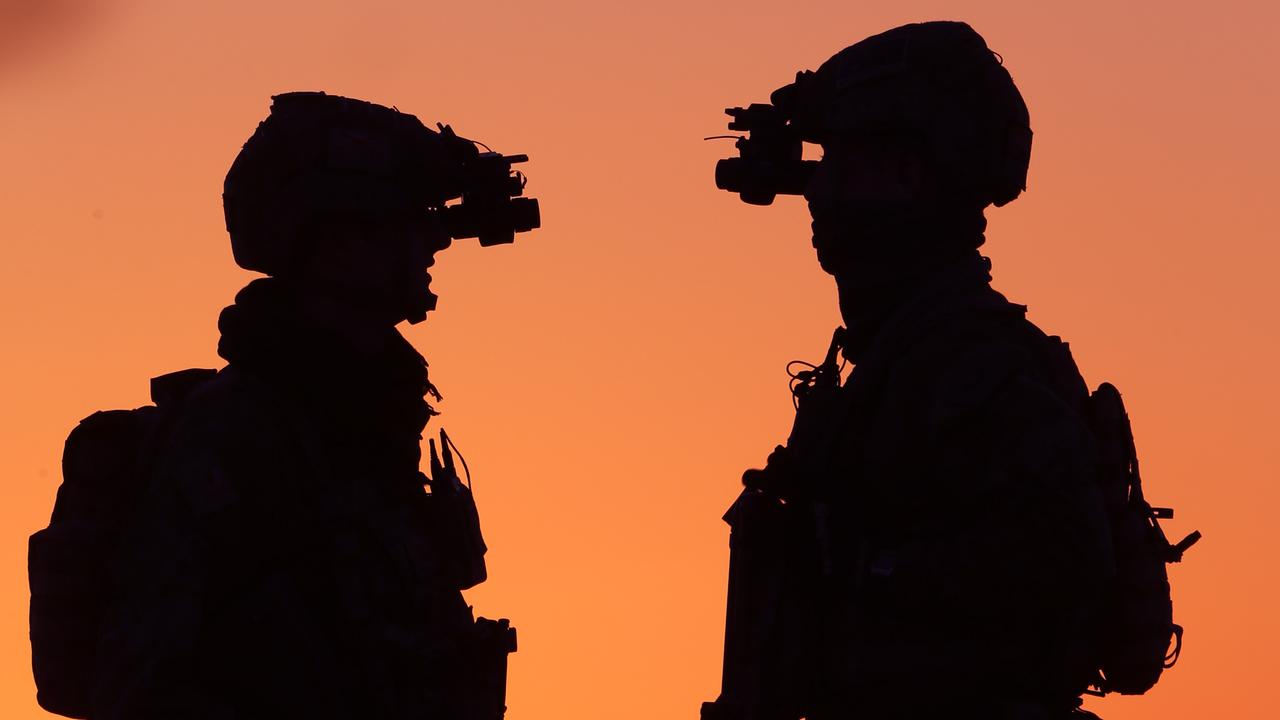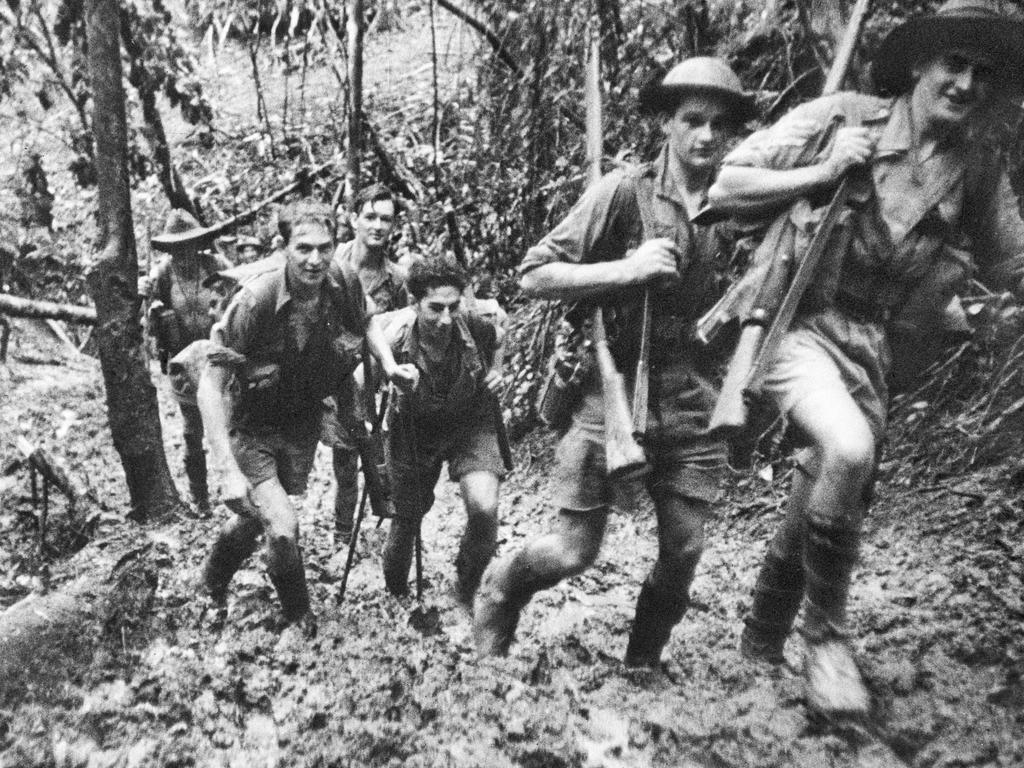Diggers at war in a nation at peace


For Australians who, this day of all days, want to be proud of their defence force and confident in the nation it defends, these doubts may be compounded by a deeper disquiet.
A year into the pandemic, among a string of economic shocks and natural disasters, dealing with ineptitude in Washington and intimidation from Beijing, our strategic environment is more dangerous and uncertain than at any time in recent memory.
If there were ever a year when the nation needed our Diggers, this is it.
In July last year, Scott Morrison called this “one of the most challenging times we have known since the 1930s and the early 1940s”. That reference recalled for me a book I read 36 years ago, in 1985, my first year at the Royal Military College, Duntroon.
David Denholm, writing as David Forrest, fought with the 58th/59th militia battalion in New Guinea and Bougainville. His novel The Last Blue Sea is a lightly fictionalised account of the Salamaua campaign of 1943, fought across the immense, rain-soaked mountain ranges of northeastern New Guinea by bedraggled militia (reservist) soldiers, commandos and Australian Imperial Force troops.
My grandfather, who fought in that campaign with the RAAF, once told me the book was “truer than history”. It is the literary equivalent of Ivor Hele’s enormous, disturbing painting Taking Old Vickers Position, which hangs in the Australian War Memorial and depicts a pivotal moment of the campaign.
Denholm wrote of 1942: “It was the year in which the nation discovered itself to be something less than perfect. Dogmas broke asunder and the pieces fell like hailstones … on the Kokoda Trail one lonely militia battalion held up the Japanese for 35 days and nights … It was Australia’s saddest, most dreadful and greatest year of all its history, and no Australian who lived in that year could ever be the same again.”
This, too, has been a year in which the nation discovered itself — and its soldiers — to be less than perfect: a year of bushfire, flood and pandemic, internal unrest and escalating international tension. Dogmas such as the centrality of the US alliance, China’s good faith as a trading partner or the stability of the globalised system we rely on are under severe strain. The Prime Minister’s historical reference is indeed apt as we pivot from distant wars fought in the Middle East in support of allies to a rising threat of great-power conflict with the capacity to inflict enormous damage much closer to home.
Given the moment we find ourselves facing, Australians have a right to expect that our defence force will operate in a way that defends our interests and reflects our values. People are rightly concerned about what the Brereton allegations say about the morality and professionalism of our forces in a long, exhausting, ambiguous fight far from home.
For what it’s worth, Defence itself brought these allegations to light, seeking an independent inquiry to get to the bottom of what really happened and hold those involved accountable. Leaders I have spoken to see this as a wake-up call that demands a robust response to set it right. I am absolutely convinced they will do just that. But there is another side to the coin. Just as we need our forces to fight in ways that uphold our values, so our troops need support from an engaged and informed public. The burden needs to be shared lest the military become a secret caste and the wars we wage a mystery to those for whom we fight.
For two decades we have been, to quote former chief of army Peter Leahy, “an army at war in a nation that feels as though it is blissfully at peace”. Our troops have paid in blood — more than 40 killed and hundreds wounded — with thousands suffering psychological and moral injury. The costs continue long after the last shot is fired, as the establishment of the royal commission into veteran suicides attests.
I well remember the dreamlike disorientation I felt walking at Circular Quay in Sydney — just back from Iraq, ears still ringing from rocket fire and sleep plagued by nightmares — watching people placidly going about their lives as if everything were perfectly normal, and of course for them it was normal. I felt as if there were a sheet of bulletproof glass, invisible but impenetrable, between me and everyone I met.
Months later I was in the Korengal in Afghanistan, a few weeks after that in a near-miss car bombing on Massoud Circle in Kabul; a year later my convoy was caught in an ambush in Dara-i-Nur district of Nangarhar province. Forty-five thousand Australians who served in the war on terror know exactly where those places are and how they look, sound and smell. Many, I’m sure, will break out in a cold sweat thinking of them. Few other Australians have a clue. This is the legacy of two decades of a defence force at war in a nation at peace.
Anzac Day, on the other hand, plugs us back into our history, reminds us that our Diggers can do us proud, as at Kokoda and Salamaua and a thousand other battles across 12 decades since Federation. But they can do that only if we, as a nation, have their back. In recent weeks — in battle simulation centres at Canungra and Enoggera, on exercise in rural NSW, on the parade ground at Duntroon, in class at the Australian Defence Force Academy, I have seen the next generation of our servicemen and women rising to the challenge of a new, more dangerous environment. I could not be more confident that they will achieve whatever the nation asks, provided we support them.
This year the horizon is darkening, but the spirit of Anzac is alive and well.
David Kilcullen served in the Australian Army from 1985 to 2007, and subsequently worked for the Australian and US governments as an intelligence analyst and counterinsurgency adviser. He served in Iraq, Afghanistan, Somalia, Libya, East Timor and Bougainville.




Anzac Day comes this year amid a sequence of events — the Afghanistan withdrawal, the announcement of a royal commission into defence and veteran suicide, the Brereton war crimes inquiry — that must make some service members, veterans and their loved ones wonder whether 20 years of the war on terror were worth the cost. I know I often find myself asking that question.